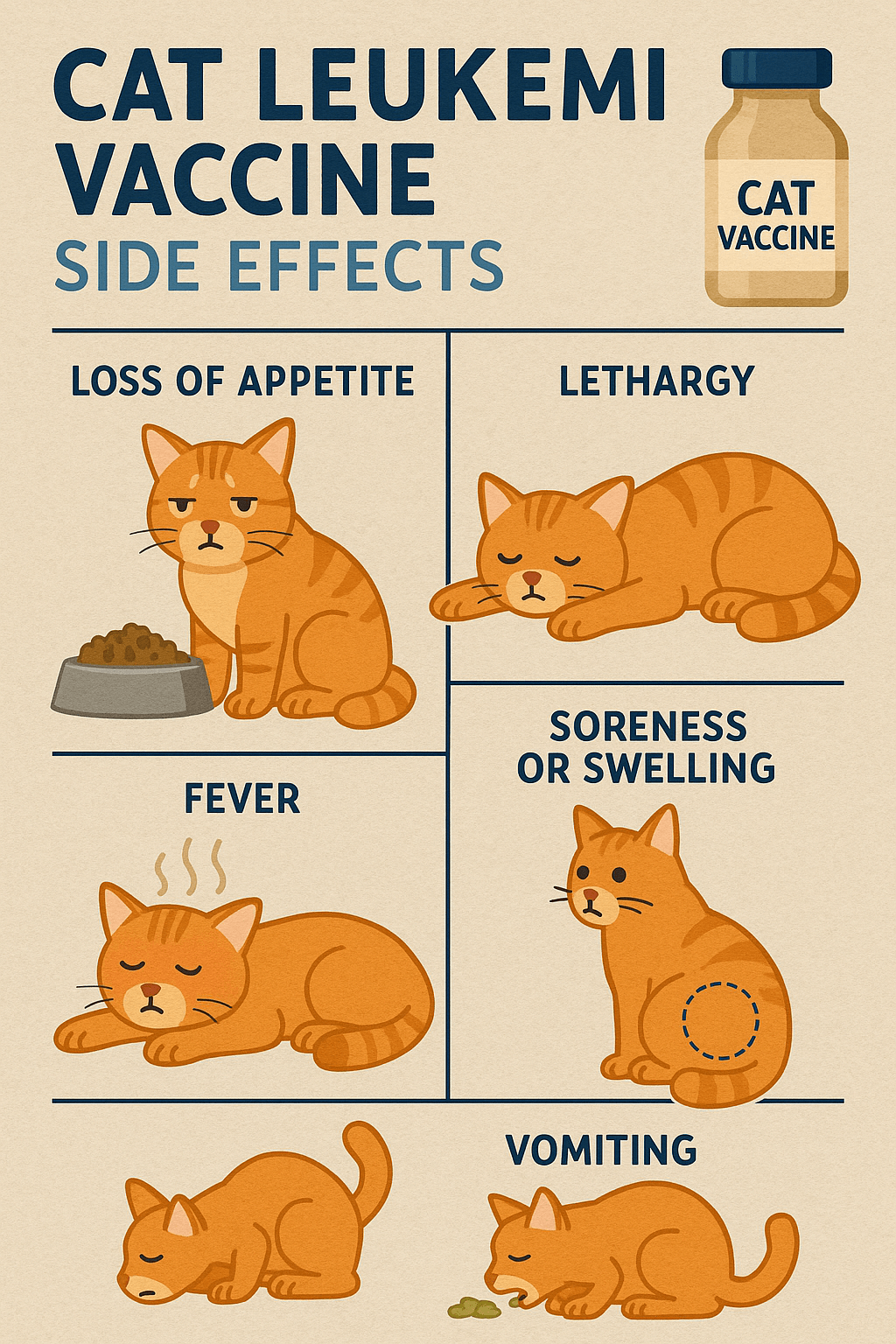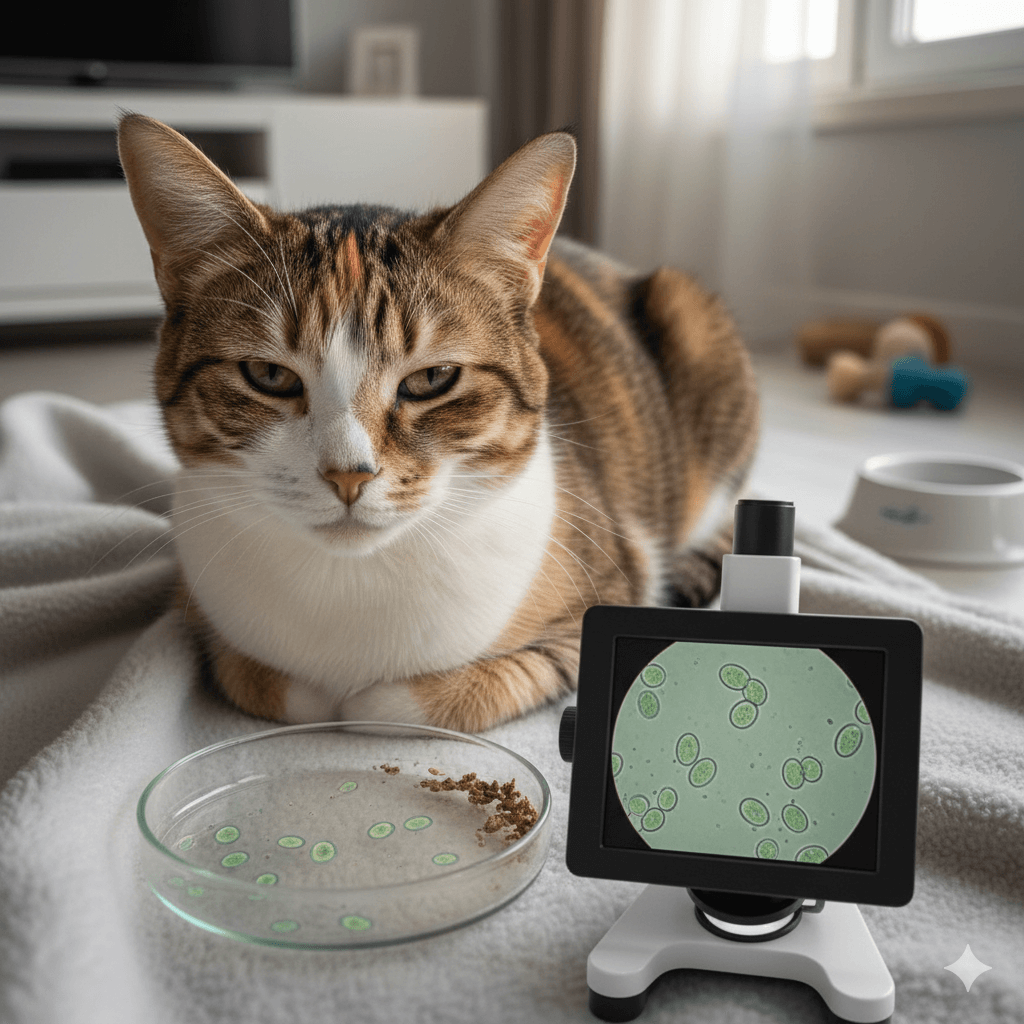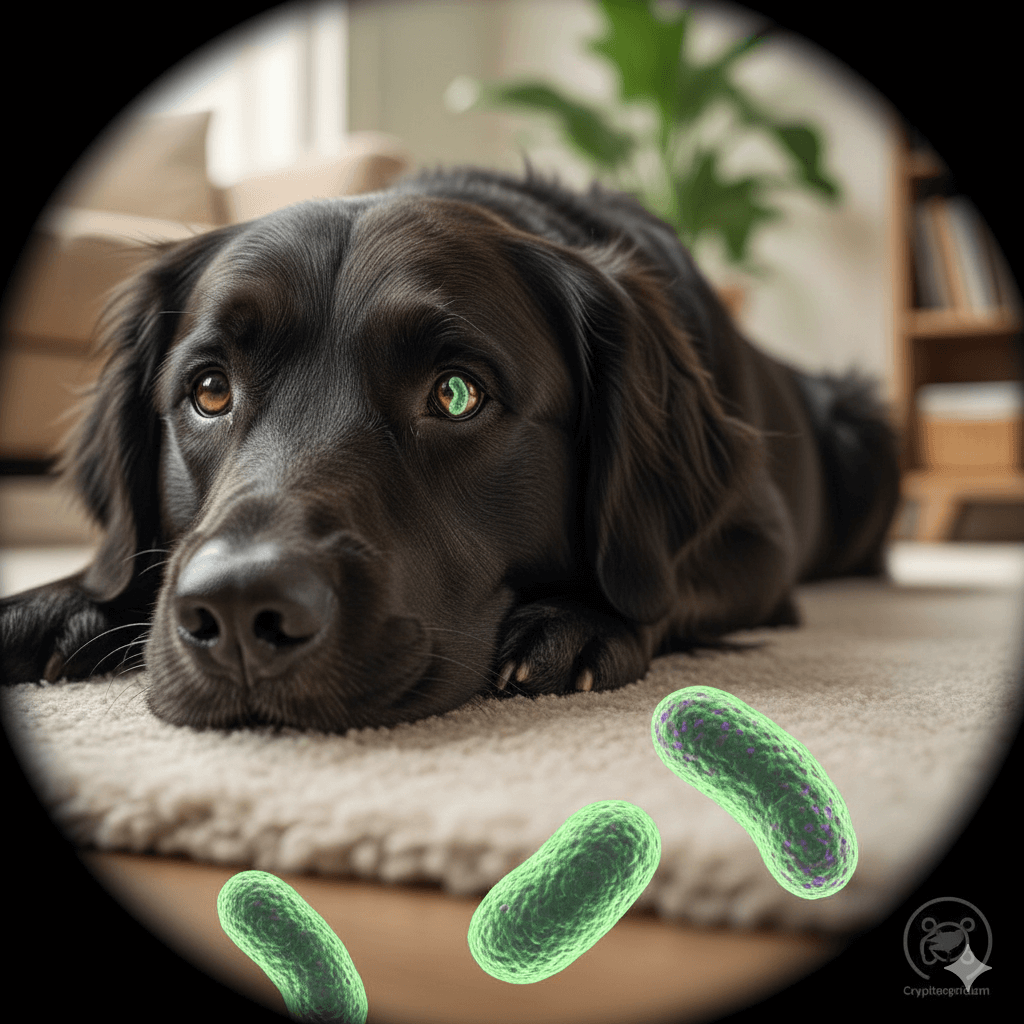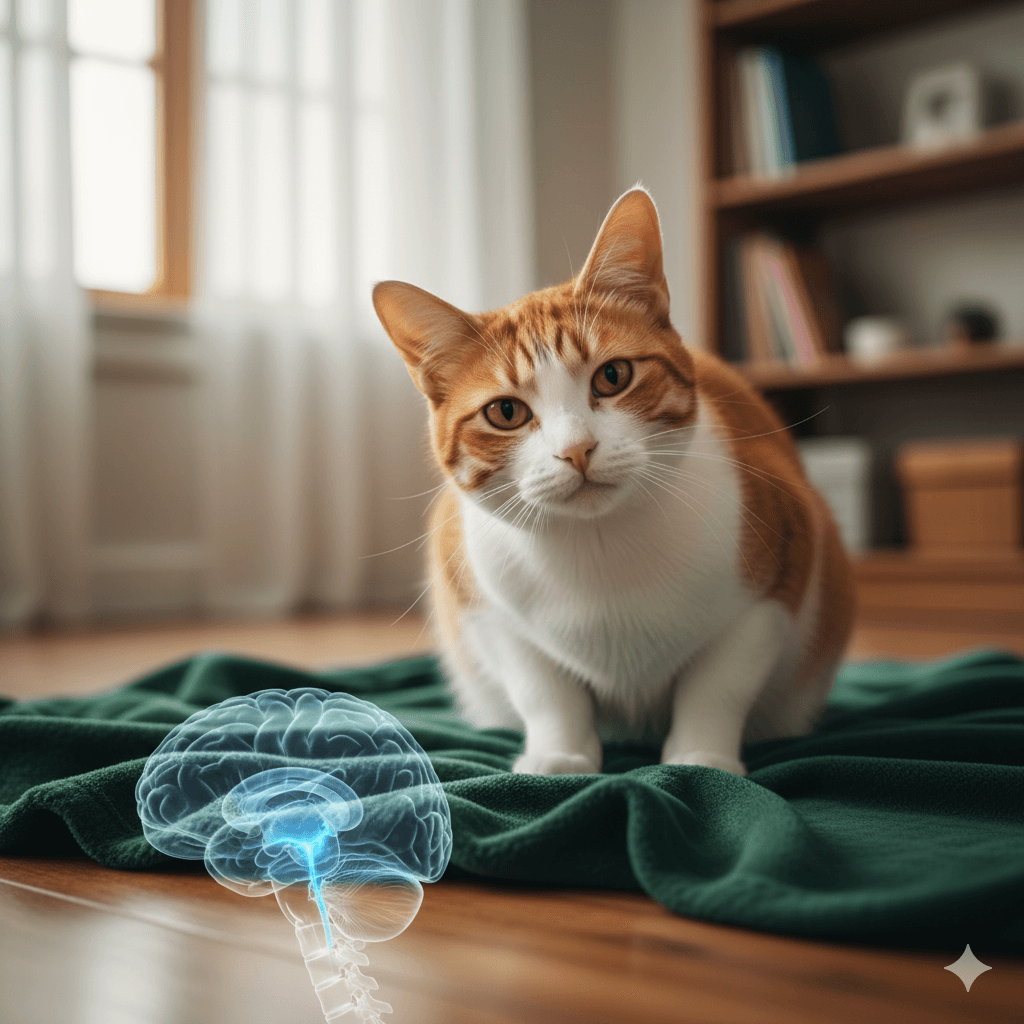Cat Leukemia Vaccine Side Effects: What Every Cat Owner Should Know
Feline leukemia virus (FeLV) is a serious and often fatal disease that affects cats worldwide. The FeLV vaccine is one of the most effective ways to protect your cat from this devastating illness, especially if they spend time outdoors or interact with other felines. However, like any medical intervention, the vaccine can come with potential side effects. Understanding these risks is crucial for making informed decisions about your cat’s health. In this blog post, we’ll explore common and rare side effects of the cat leukemia vaccine, how to manage them, and what steps you can take to ensure your pet stays safe and healthy.
Expert Insight: Understanding the Immune Response to FeLV
“When the body encounters a pathogen like FeLV, there is an initial immune reaction, but this is a basic, non-specific attack. It takes time for the immune system to recognize the viral antigen and create specific antibodies to fight it, so there is a period where the virus can take hold before a proper defense is initiated.”
Common Side Effects of the Cat Leukemia Vaccine
While the FeLV vaccine is generally safe, some cats may experience mild side effects shortly after vaccination. These reactions are typically temporary and resolve on their own without intervention.
Soreness at the Injection Site:
Cats may exhibit sensitivity or discomfort around the area where the vaccine was administered. This soreness usually subsides within a few days.Lethargy or Fatigue:
It’s normal for vaccinated cats to feel tired or less energetic for a day or two as their immune system responds to the vaccine.Mild Fever:
A slight increase in body temperature is a common reaction as the body builds immunity to the virus.Loss of Appetite:
Some cats may eat less than usual for a short period after receiving the vaccine. This typically resolves quickly.Localized Swelling:
A small lump may form at the injection site, which should disappear within a week or two.
These common side effects are generally not cause for concern, but monitoring your cat closely ensures that any unusual symptoms are addressed promptly.
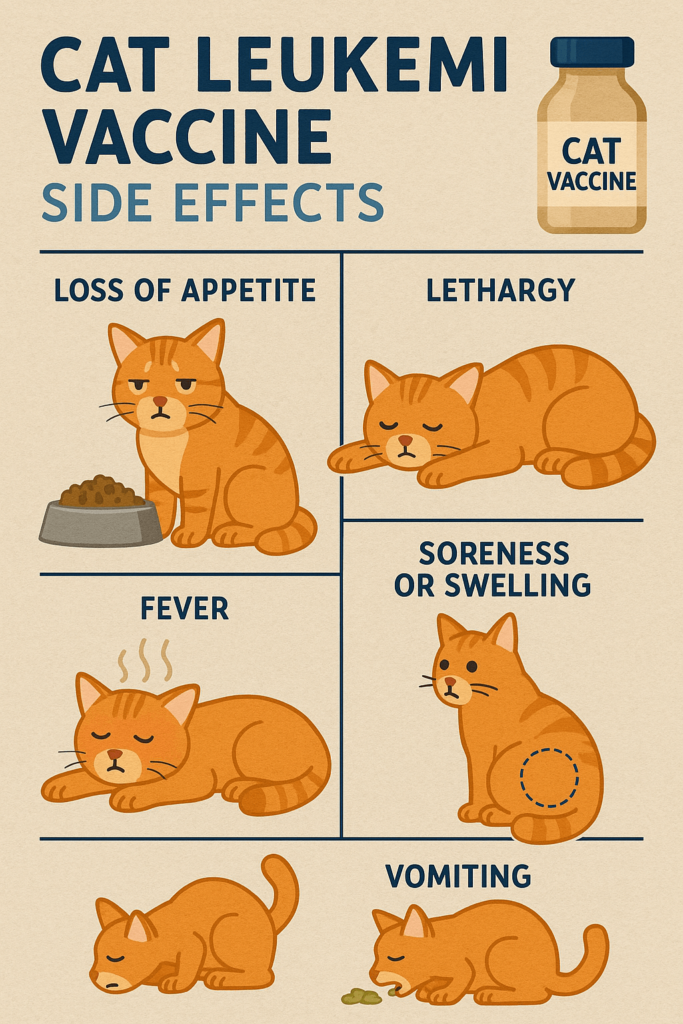
Rare but Serious Side Effects to Watch For
Although uncommon, some cats may experience more severe reactions to the FeLV vaccine. Recognizing these signs early can help prevent complications and ensure timely veterinary care.
Allergic Reactions (Anaphylaxis):
Symptoms include difficulty breathing, swelling of the face, and collapse. Immediate veterinary attention is required if these occur.Injection-Site Sarcomas:
In very rare cases, vaccines can lead to the development of cancerous tumors at the injection site. This typically occurs months or years later.Persistent Vomiting or Diarrhea:
Gastrointestinal upset that lasts more than a day could indicate an adverse reaction to the vaccine.Severe Lethargy or Weakness:
If your cat appears extremely weak or unresponsive, it may be a sign of a more serious issue requiring medical evaluation.Behavioral Changes:
Significant shifts in behavior, such as aggression or extreme hiding, could signal discomfort or illness related to the vaccine.
While these side effects are rare, staying vigilant allows you to act quickly if your cat shows any concerning symptoms.
Check this guide 👉Can I Give My Cat Vaccines Myself? Best 7 Expert Tips!
Check this guide 👉How Much Are Cat Vaccines? Best 7 Health Tips!
Check this guide 👉I Dont Know If My Cat Has Been Vaccinated: Best 7 Tips!
Common Side Effects | Serious Side Effects |
|---|---|
Soreness at injection site | Allergic reactions (anaphylaxis) |
Mild fever | Injection-site sarcomas |
Temporary lethargy | Persistent vomiting or diarrhea |
Loss of appetite | Severe lethargy or weakness |
Localized swelling | Behavioral changes |
How to Minimize Risks Associated with the Vaccine
Taking proactive steps before and after vaccination can reduce the likelihood of side effects and ensure your cat’s safety. Here are some practical tips to consider.
Consult Your Veterinarian:
Discuss your cat’s health history and lifestyle with your vet to determine if the FeLV vaccine is necessary for your pet.Monitor Your Cat After Vaccination:
Keep a close eye on your cat for 24-48 hours after the vaccine to catch any adverse reactions early.Choose a Trusted Veterinarian:
Ensure your vet follows proper protocols and administers high-quality vaccines to minimize risks.Avoid Over-Vaccination:
Follow your vet’s recommended schedule and avoid unnecessary boosters that could increase side effect risks.Comfort Your Cat Post-Vaccination:
Provide a quiet, cozy space for your cat to rest and recover after receiving the vaccine.
By taking these precautions, you can help ensure a smooth and safe vaccination experience for your feline companion.
When to Seek Veterinary Care After Vaccination
Most cats tolerate the FeLV vaccine well, but there are instances when professional medical advice or intervention is necessary. Knowing when to contact your vet can make all the difference.
Difficulty Breathing:
Labored or rapid breathing could indicate an allergic reaction requiring immediate attention.Swelling That Worsens Over Time:
If the injection site becomes increasingly swollen or painful, consult your vet to rule out complications.Prolonged Lethargy:
If your cat remains unusually tired or unresponsive for more than 48 hours, seek veterinary guidance.Persistent Vomiting or Diarrhea:
Gastrointestinal issues lasting more than a day may require medical evaluation to address underlying causes.Unusual Aggression or Hiding:
Behavioral changes that persist beyond a day could signal stress or illness related to the vaccine.
Prompt action ensures your cat receives the care they need if complications arise, safeguarding their long-term health.
Tips for Preparing Your Cat for Vaccination
Preparing your cat for vaccination can help reduce stress and minimize the risk of adverse reactions. Here are some helpful strategies to consider.
Schedule During Calm Times:
Avoid vaccinating your cat during periods of stress, such as moving or introducing new pets to the home.Feed a Balanced Diet:
Ensuring your cat is in good health before vaccination supports their immune system and recovery.Administer Calming Products (if needed):
Use calming sprays or supplements to soothe anxious cats before their vet visit.Bring Familiar Items:
Bring a blanket or toy from home to comfort your cat during the appointment.Stay Calm Yourself:
Cats pick up on their owner’s emotions; staying relaxed helps keep them calm too.
Proper preparation sets the stage for a smoother vaccination experience.
Understanding the Importance of Booster Shots
Booster shots play a critical role in maintaining immunity against feline leukemia. Here’s why they matter and how to approach them responsibly.
Reinforce Immunity Over Time:
Boosters help maintain long-term protection as initial vaccine immunity wanes.Tailor to Your Cat’s Lifestyle:
Outdoor cats or those exposed to other felines may need regular boosters, while indoor-only cats might require fewer.Follow Your Vet’s Schedule:
Adhering to recommended timelines ensures optimal protection without over-vaccinating.Monitor for Side Effects:
Even with boosters, keep an eye out for adverse reactions similar to the initial vaccine.Discuss Alternatives if Needed:
If your cat has had previous reactions, talk to your vet about alternative prevention methods.
Responsible booster management balances protection with your cat’s well-being.
Alternative Ways to Protect Your Cat from Feline Leukemia
Vaccination isn’t the only way to safeguard your cat from feline leukemia. These additional measures can further reduce their risk of exposure.
Limit Outdoor Access:
Keeping your cat indoors minimizes contact with infected animals.Screen New Pets Before Introducing Them:
Test new cats for FeLV before allowing them to interact with your existing pets.Provide Separate Food and Water Bowls:
Prevent shared resources that could spread the virus among cats.Regular Veterinary Check-Ups:
Routine exams help detect early signs of illness and ensure overall health.Educate Yourself on Transmission Risks:
Understanding how FeLV spreads allows you to take targeted preventive actions.
Combining vaccination with these strategies creates a comprehensive approach to feline leukemia prevention.
Frequently Asked Questions About Cat Leukemia Vaccine Side Effects
Is the FeLV vaccine safe for all cats?
While generally safe, the vaccine may pose risks for cats with certain health conditions. Always consult your vet before vaccinating.
How long do side effects last?
Most side effects resolve within a few days. Persistent symptoms should be evaluated by a veterinarian.
Can indoor cats skip the FeLV vaccine?
Indoor cats with no exposure to other cats may not need the vaccine, but consult your vet to assess individual risk factors.
What is an injection-site sarcoma?
A rare type of cancer that can develop at the vaccine injection site, typically months or years later.
How can I comfort my cat after vaccination?
Provide a quiet space, gentle petting, and monitor them closely for any signs of discomfort.
Prioritizing Your Cat’s Health and Well-Being
The cat leukemia vaccine is a vital tool in protecting your feline friend from a potentially deadly disease. While side effects are possible, understanding their nature and knowing how to respond empowers you to make informed decisions about your cat’s care. By working closely with your veterinarian, monitoring your cat’s health, and taking preventive measures, you can minimize risks and ensure your pet lives a long, happy life. Remember, your vigilance and love are the best safeguards against any potential challenges along the way.
Understanding Cryptosporidium in Cats: Best 7 Expert Tips! – Spot symptoms, treat safely, and stop parasite spread in your home.
Understanding Cryptosporidium in Dogs: Best 7 Expert Tips! – Learn symptoms, treatment & prevention for this stubborn gut parasite.
Understanding Syringomyelia in Cats: Best 7 Expert Tips! – Recognize signs, manage pain, and support your cat’s neurological health with vet-backed guidance.
Understanding Syringomyelia in Dogs: Best 7 Expert Tips! – Expert insights on symptoms, MRI diagnosis, pain management & quality of life.

